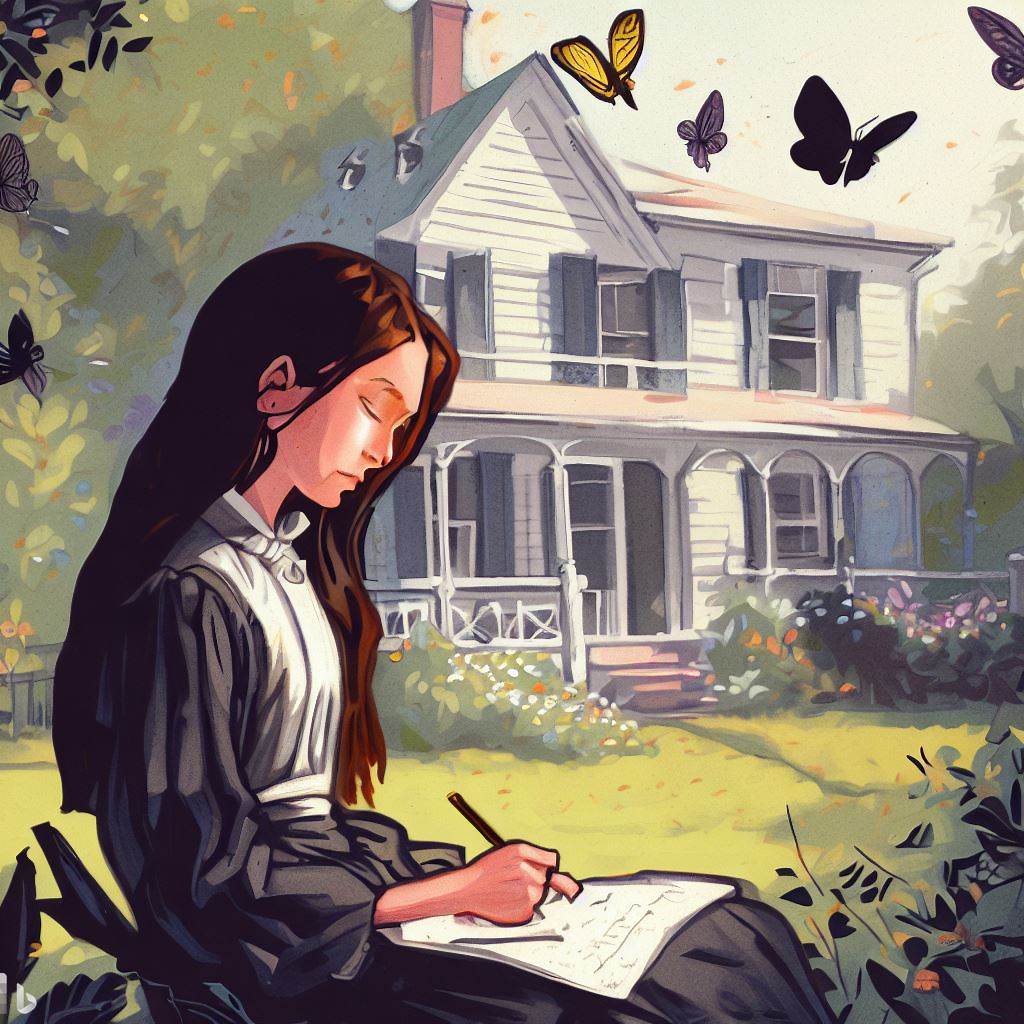Introduction to Cécile Coulon
Cécile Coulon, a prodigious French literary figure, has quickly ascended to prominence in the literary world with her compelling narratives and evocative prose. Born in 1990 in Clermont-Ferrand, France, Coulon displayed an early affinity for storytelling. Her childhood in the idyllic yet austere landscapes of the Auvergne region has significantly influenced her writing, infusing her works with a deep sense of place and atmosphere that resonates with readers.
Her academic journey led her to pursue literature at the University of Clermont-Ferrand, where her passion for writing was further nurtured. It was during her university years that Coulon began to make her mark in the literary arena. Her debut novel, “Le Voleur de Vie,” was published when she was just 16, showcasing her remarkable talent and setting the stage for a prolific career.
Coulon’s literary oeuvre spans multiple genres, including contemporary fiction, poetry, and essays. Her works frequently explore themes of rural life, human relationships, and the passage of time, often drawing on her personal experiences and observations. Influenced by a range of writers from William Faulkner to Émile Zola, Coulon’s storytelling is characterized by its lyrical quality and profound emotional depth. Her ability to weave intricate narratives with vivid descriptions has garnered her a dedicated readership and critical acclaim.
In addition to her novels, Coulon has also made significant contributions to poetry and short stories, further showcasing her versatility as a writer. Her poignant and reflective style has earned her several literary awards, cementing her status as a formidable voice in contemporary literature. As we delve deeper into Coulon’s literary world, it becomes evident that her work not only captivates but also challenges and inspires, offering a rich tapestry of human experience and emotion.
Early Works and Debut Novels
Cécile Coulon, a prominent figure in contemporary French literature, made an indelible mark with her early works and debut novels. Her literary journey began with the publication of “Le Voleur de Vie” in 2007, a novel that introduced readers to her distinctive narrative style and thematic preoccupations. Despite her young age, Coulon’s writing exhibited a maturity and depth that captivated critics and readers alike.
Her debut was followed by “Les Ronces” in 2010, a work that further solidified her reputation. This novel delved into the complexities of human relationships and the often tumultuous path to self-discovery. Coulon’s ability to weave intricate plots with deeply emotional undertones became a hallmark of her early literary endeavors. The critical reception was overwhelmingly positive, with many praising her lyrical prose and the vividness of her characters.
The themes explored in these early novels often revolved around the fragility of life, the inevitability of change, and the pursuit of identity. Coulon’s protagonists frequently grapple with internal and external conflicts, navigating their way through life’s unpredictable terrain. This exploration of universal themes through a personal lens resonated with a wide audience, establishing a strong foundation for her burgeoning career.
Another significant work from this period is “Le Roi N’a Pas Sommeil” (2012), which tells a haunting tale of family secrets and rural isolation. The narrative style in this novel is marked by its poetic nature, blending realism with a touch of the surreal. Coulon’s ability to create a sense of place and evoke powerful emotions through her writing garnered critical acclaim, further cementing her status as a rising star in the literary world.
These early works not only showcased Coulon’s talent but also set the stage for her subsequent success. They established her voice, characterized by a unique blend of poetic elegance and raw emotional intensity. Through her debut novels, Cécile Coulon carved out a niche for herself, promising a prolific and influential career ahead.
Three Seasons of Hell marked a significant milestone in Cécile Coulon’s literary career, propelling her into the limelight. This breakthrough novel intricately weaves the lives of its characters against the backdrop of a small, insular village. The story revolves around the complex dynamics between three central figures: Camille, a young woman burdened by her family’s legacy; Louis, a brooding, solitary farmer; and Pierre, a disillusioned, once-prominent writer.
The novel delves deeply into themes of isolation, the burden of tradition, and the inescapable nature of one’s past. Coulon’s narrative is rich with evocative descriptions, capturing the austere beauty of the countryside and the inner turmoil of her characters. Her portrayal of the village as an almost sentient entity, shaping and constraining the destinies of its inhabitants, adds a haunting layer to the story.
Upon its release, Three Seasons of Hell was met with critical acclaim. Reviewers praised Coulon’s masterful storytelling and her ability to convey profound emotional depth through her characters. The novel’s exploration of universal themes resonated with a wide audience, earning it a substantial commercial success. It wasn’t long before the literary world took notice of Coulon’s unique voice and narrative prowess.

The novel’s impact was further solidified by its recognition in various literary circles. Three Seasons of Hell garnered several prestigious awards, including the Prix des Libraires, which celebrates outstanding contributions to literature from French-speaking regions. This accolade not only affirmed Coulon’s talent but also broadened her readership, establishing her as a formidable force in contemporary literature.
In essence, Three Seasons of Hell is more than just a novel; it is a compelling exploration of human nature and the complexities of life in a close-knit community. Cécile Coulon’s ability to intertwine these elements seamlessly has set a high standard in her literary journey, marking her as a significant figure in modern literature.
Exploring ‘The Heart of the Beast’
‘The Heart of the Beast’ stands as a pivotal work in Cécile Coulon’s literary repertoire, showcasing her narrative prowess and thematic boldness. The novel intricately weaves a tale of human frailty and resilience, set against the backdrop of a rural community grappling with its own internal demons. At its core, ‘The Heart of the Beast’ explores the dichotomy of human nature—the capacity for both profound kindness and unsettling cruelty.
The story follows the lives of several villagers, each character meticulously crafted to reflect the diverse spectrum of human experience. Through their interactions, Coulon delves into themes of love, betrayal, and redemption. The central character, a young woman named Claire, embodies the struggle between personal desire and societal expectations. Her journey is a poignant exploration of self-discovery and the often-painful quest for authenticity in a world rife with judgement.
Coulon’s growth as a writer is evident in ‘The Heart of the Beast.’ Her prose is both evocative and precise, capturing the essence of rural life with a vividness that immerses the reader in the setting. Thematically, the novel is rich with symbolism; the titular ‘beast’ serves as a metaphor for the hidden, darker aspects of the human psyche. This work marks a significant step forward from her earlier novels, demonstrating a more sophisticated handling of complex emotional and moral landscapes.
Comparatively, ‘The Heart of the Beast’ shows a maturation in Coulon’s storytelling. While her previous works, such as ‘Three Seasons of Hell,’ also grapple with intense emotional and societal issues, this novel presents a more nuanced and layered narrative. The character development is particularly noteworthy, with each individual’s arc contributing to a broader commentary on the human condition. Coulon’s ability to interlace personal and communal struggles highlights her evolution as a writer capable of profound insight and empathy.
Themes and Styles in Coulon’s Writing
Cécile Coulon’s literary oeuvre is marked by an intricate interplay of recurring themes and a distinctive stylistic approach that sets her apart in contemporary literature. One of the most striking aspects of her writing is her exploration of human emotions and psychological depth. Coulon delves into the complexities of her characters’ inner lives, often portraying them as grappling with existential dilemmas, familial conflicts, and profound personal struggles. This emotional richness is a defining trait of her narratives, providing readers with a deep, empathetic connection to her characters.
In addition to her thematic focus on human psychology, Coulon’s work frequently addresses the relationship between individuals and their environments. She often situates her stories in rural or semi-rural settings, using the natural world as a backdrop to reflect the internal states of her characters. This symbiosis between character and setting enhances the thematic resonance of her stories, creating a nuanced tapestry of human experience intertwined with the natural world.
Stylistically, Coulon’s prose is both lyrical and precise. Her use of language is evocative, painting vivid pictures while maintaining an economy of words that avoids superfluity. Narratively, she often employs a multi-layered approach, weaving together different timelines and perspectives to create a rich, textured narrative. This technique not only adds depth to her storytelling but also allows for a more comprehensive exploration of her themes.
Over the years, Coulon’s writing style has evolved, becoming more refined and sophisticated. Early works exhibit a raw, unfiltered quality, while her more recent publications display a matured, polished prose. Despite this evolution, her voice remains consistently unique, characterized by its emotional intensity and thematic depth. This unique voice, coupled with her ability to articulate profound human experiences, cements Cécile Coulon’s place in the pantheon of contemporary literary figures.
Impact and Influence
Cécile Coulon has carved a notable niche in the literary world, leaving a lasting impact through her vivid storytelling and profound themes. Her works have not only captivated readers but also garnered significant attention from literary critics. From the outset of her career, Coulon’s novels have been lauded for their intricate character development and evocative prose, solidifying her reputation as a formidable contemporary author.
Critics have often highlighted Coulon’s unique ability to weave complex human emotions into her narratives. The French literary critic, Bernard Pivot, praised her novel “Trois saisons d’orage” as “a masterful exploration of human resilience and the inexorable passage of time.” Similarly, the renowned literary magazine, Le Monde, described her writing as “a powerful blend of raw emotion and poetic beauty, a combination that sets her apart in the modern literary landscape.”
Coulon’s influence extends beyond critical acclaim, resonating deeply with her readership. Fans frequently express their admiration for her ability to articulate the subtleties of the human condition. One reader’s testimonial reflects this sentiment: “Reading Cécile Coulon’s books feels like peering into the soul of humanity. Her words are not just read; they are felt deeply.” Another fan commented, “Her stories linger long after the last page is turned, an enduring testament to her skill as a storyteller.”
Additionally, Cécile Coulon’s influence has permeated the works of emerging writers, who often cite her as an inspiration. Her exploration of rural life and the human psyche has paved the way for a new generation of authors to delve into similar themes with renewed vigor and authenticity. Thus, Cécile Coulon’s impact on the literary world is multifaceted, encompassing critical acclaim, reader devotion, and a tangible influence on future writers.

Recent Works and Future Projects
Cécile Coulon, a prominent figure in contemporary French literature, continues to captivate readers with her recent publications. Among her latest works is “Une bête au Paradis” (A Beast in Paradise), a novel that delves into the complexities of rural life and human emotions. This book has garnered significant acclaim for its raw and poignant portrayal of family dynamics and the relentless grip of the past. Critics have praised Coulon’s ability to weave a compelling narrative that is both haunting and beautiful, cementing her reputation as a master storyteller.
Additionally, Coulon’s collection of short stories, “Les Ronces” (The Brambles), offers readers a glimpse into her versatility as a writer. This compilation explores themes of nature, love, and loss, showcasing her talent for capturing profound human experiences in concise and evocative prose. The reception of “Les Ronces” has been overwhelmingly positive, with many lauding Coulon’s lyrical style and keen observational skills.
Looking ahead, Cécile Coulon is set to embark on new literary ventures that promise to be as engaging as her previous works. She has hinted at a forthcoming novel that will explore urban landscapes and the intricate lives of city dwellers. This shift in setting marks a departure from her earlier focus on rural environments, indicating a potential evolution in her thematic and stylistic approach. Readers can anticipate a fresh perspective while still enjoying the depth and richness that characterize Coulon’s writing.
Coulon is also rumored to be working on a screenplay, further expanding her creative horizons. This foray into film underscores her commitment to storytelling across different mediums, and fans eagerly await how her narrative prowess will translate to the screen. As Cécile Coulon continues to evolve as a writer, readers can look forward to a diverse array of projects that maintain the emotional intensity and literary excellence for which she is renowned.
Conclusion: The Legacy of Cécile Coulon
Throughout this exploration of Cécile Coulon’s literary world, we have delved into the profound impact of her narratives and the distinctive voice she brings to contemporary literature. Coulon’s works stand out for their poignant examination of human emotions, societal norms, and the often tumultuous relationship between individuals and their surroundings. Her storytelling, characterized by a blend of poetic prose and raw realism, offers readers a deep and immersive experience, making her a significant figure in modern French literature.
Coulon’s ability to weave intricate tales that resonate on both personal and universal levels has garnered her a dedicated readership and critical acclaim. Her novels, such as “Le Rire du Grand Blessé” and “Une Bête au Paradis,” highlight her versatility in addressing diverse themes, from the fragility of human existence to the complexities of rural life. Through her vivid characterizations and evocative settings, Coulon invites readers to confront their own realities and reflect on broader societal issues.
The legacy of Cécile Coulon is one of a writer unafraid to challenge conventions and push the boundaries of literary form. Her works continue to inspire and provoke thought, encouraging a deeper appreciation for the art of storytelling. As readers embark on their journey through Coulon’s books, they are likely to find themselves captivated by her unique narrative style and insightful commentary on the human condition.
In conclusion, Cécile Coulon’s contributions to literature are marked by her unwavering commitment to authenticity and her remarkable ability to capture the essence of life’s complexities. Her storytelling not only entertains but also enlightens, making her a pivotal voice in contemporary literature. For those yet to experience her work, diving into the rich tapestry of her novels promises an unforgettable literary adventure, one that underscores the enduring power and beauty of the written word.






